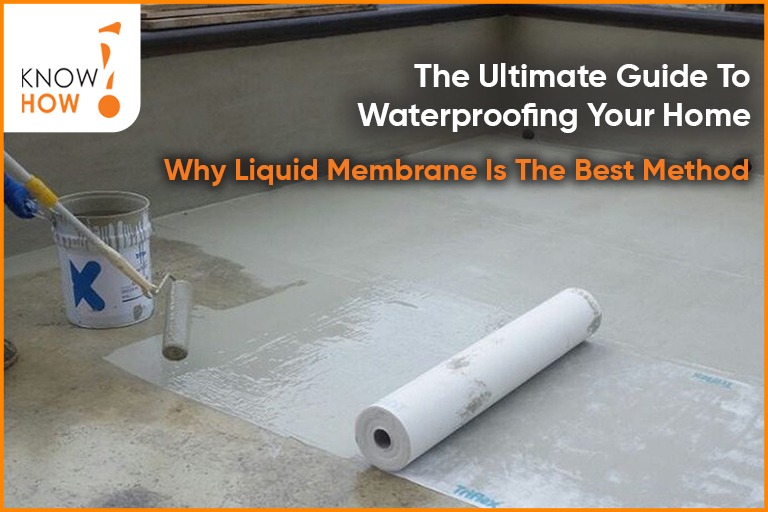Waterproofing your home is a crucial step in protecting it from water damage. Water intrusion can lead to structural issues, mold growth, and costly repairs. With numerous waterproofing methods available, it can be challenging to choose the most effective solution. In this ultimate guide, we will explore the importance of waterproofing, discuss different methods, and explain why liquid membrane is considered the best method. By understanding the benefits of liquid membrane and following the guidance provided, you can ensure a dry and secure home environment.
1. The Importance of Waterproofing
Waterproofing is essential to protect your home from water damage. Water intrusion can weaken the structure, cause mold growth, and create an unhealthy living environment. By implementing effective waterproofing measures, you can prevent these issues and ensure the longevity of your home.
2. Common Waterproofing Methods
There are several methods available for waterproofing your home, including cementitious coatings, bituminous membranes, and liquid membranes. Each method has its advantages and applications, but liquid membrane stands out as the best solution for various reasons.
3. Introduction to Liquid Membrane
Liquid membrane is a versatile and durable waterproofing system that provides seamless protection against water intrusion. It is a flexible coating applied in liquid form and cures to form a continuous, elastomeric membrane. Liquid membrane is commonly used for roofs, balconies, basements, and other areas prone to water exposure.
4. Advantages of Liquid Membrane
Liquid membrane offers several advantages that make it the best waterproofing method for your home:
- Seamless Protection: Liquid membrane forms a seamless and monolithic layer, eliminating the risk of water penetration through joints or seams.
- Flexibility: Liquid membrane is highly flexible and can accommodate structural movements without cracking or compromising its waterproofing capabilities.
- Ease of Application: Liquid membrane is easy to apply, allowing for efficient installation. It can be brushed, rolled, or sprayed onto various surfaces, adapting to different shapes and contours.
- Longevity: Liquid membrane has excellent durability and can withstand the effects of UV rays, temperature changes, and weathering, ensuring long-lasting protection for your home.
- Versatility: Liquid membrane can be applied to a wide range of surfaces, including concrete, masonry, metal, and wood. It is suitable for both new construction and retrofit projects.
- Cost-Effectiveness: Liquid membrane offers a cost-effective solution due to its ease of application, minimal maintenance requirements, and long-term durability.
5. Application of Liquid Membrane
Proper application is crucial to maximize the benefits of liquid membrane. The following steps outline the general process:
- Surface Preparation: Thoroughly clean the surface to remove dirt, debris, and contaminants. Repair any cracks or defects using appropriate materials. Ensure the surface is dry before applying the liquid membrane.
- Priming: Apply a primer to enhance adhesion between the substrate and the liquid membrane. The primer helps create a strong bond and improves the overall effectiveness of the waterproofing system.
- Liquid Membrane Application: Apply the liquid membrane using a brush, roller, or spray equipment, following the manufacturer’s instructions. Ensure even coverage and the recommended thickness for optimal performance.
- Curing and Drying: Allow the liquid membrane to cure and dry according to the manufacturer’s guidelines. This step is crucial for the membrane to form a solid, impermeable barrier.
6. Frequently Asked Questions
Q: Can liquid membranes be applied to existing structures?
A: Yes, liquid membranes can be applied to both new and existing structures. Proper surface preparation is necessary to ensure adhesion and the effectiveness of the waterproofing system.
Q: How long does a liquid membrane last?
A: The longevity of liquid membrane depends on various factors, including the quality of the product, environmental conditions, and maintenance. With proper installation and regular maintenance, liquid membrane can provide reliable waterproofing for many years.
Q: Is liquid membrane suitable for all types of surfaces?
A: Liquid membrane is versatile and can be applied to various surfaces such as concrete, masonry, metal, and wood. It is compatible with most common construction materials used in residential and commercial buildings.
Conclusion
Waterproofing your home is essential for protecting it from water damage and maintaining its structural integrity. While various waterproofing methods exist, liquid membrane stands out as the best solution due to its seamless protection, flexibility, ease of application, longevity, versatility, and cost-effectiveness. By understanding the advantages of liquid membrane and following proper application techniques, you can ensure a dry and secure home environment for years to come.

